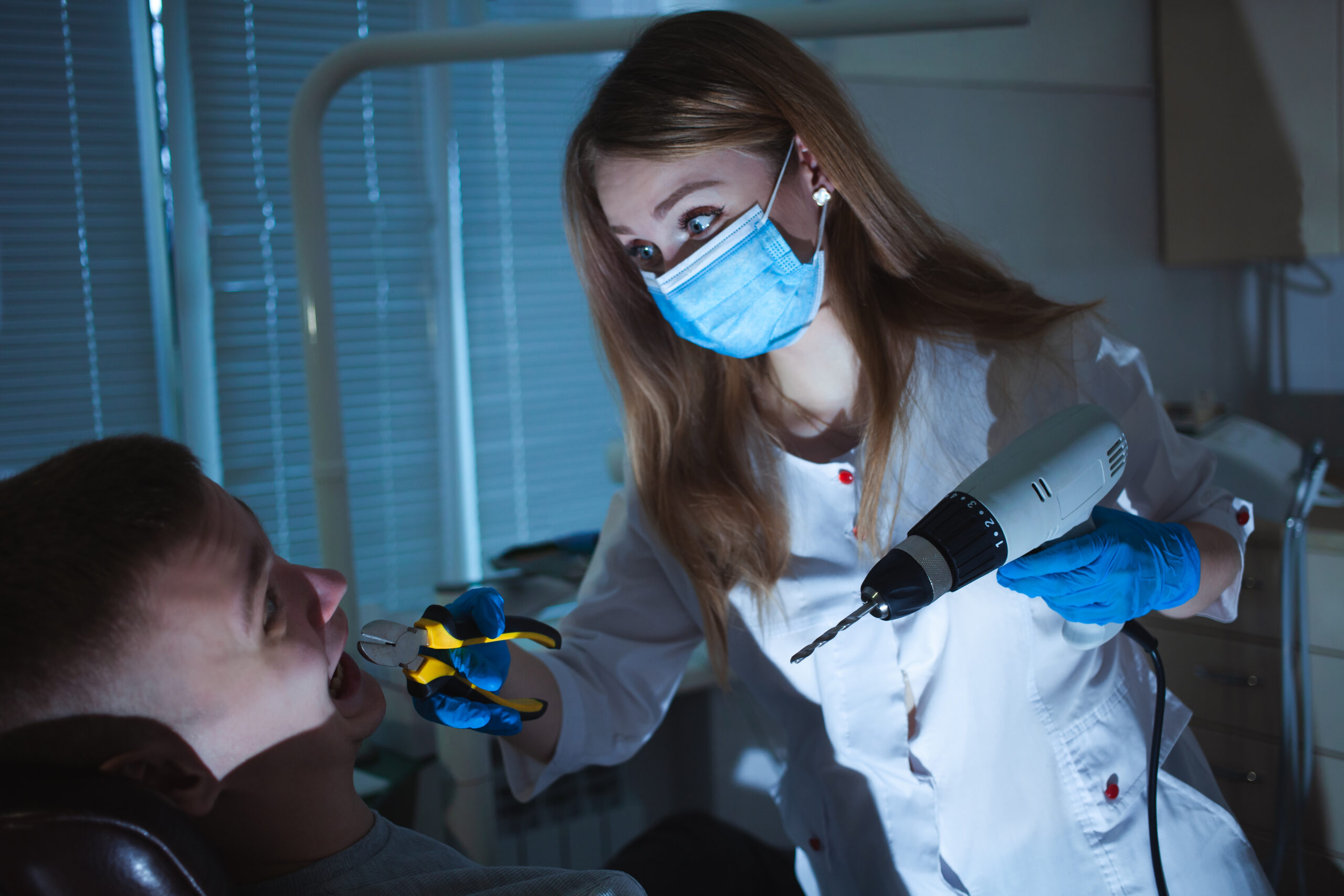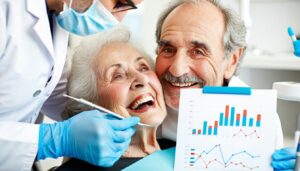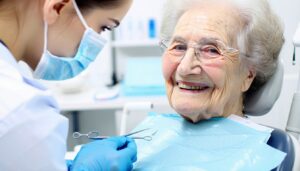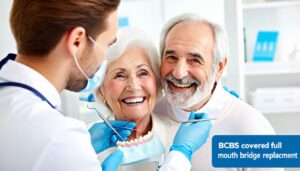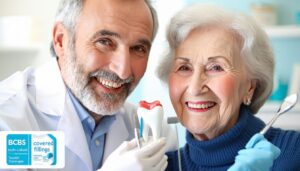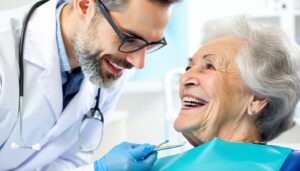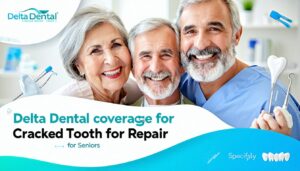Understand oral cancer screening
If you have ever wondered why dentists run their fingers along your cheeks or peer carefully around your gums, you are not alone. Oral cancer screening is often part of a routine checkup, allowing dental professionals to identify possible early signs of cancer or precancerous cells. According to the Cleveland Clinic, approximately 63% of people with oral cavity cancer are alive five years after diagnosis (Cleveland Clinic), and many experts suggest early detection can improve these odds even further. By detecting issues before they have a chance to worsen, you greatly increase your chances of successful treatment and recovery.
At Vivid Dental Raleigh, you or your loved one can count on a supportive team that prioritizes prevention and advanced care. Whether you have concerns due to lifestyle habits, family history, or unexplained mouth pain, a friendly and knowledgeable dental professional can assess your mouth, throat, and surrounding tissues for abnormalities. This compassionate approach not only helps keep an eye on suspicious areas but also ensures you have the support necessary for long-term health.
When done regularly, screening for oral cancer is a quick, painless procedure that helps your dentist keep track of subtle changes in your mouth. During each exam, they check for lumps, ulcers, white or red patches, or thickened areas under the mucosal lining. These examinations help detect potential problems early. And if further testing is needed, you can collaborate with your dentist to determine the most appropriate follow-up tests or treatments.
Recognize common risk factors
You may wonder why some people are more susceptible to oral cancer than others. Researchers have identified several key risk factors:
-
Tobacco use
Tobacco is a leading cause of oral cancer worldwide. Regardless of whether it is smoked or chewed, tobacco introduces chemicals that damage cells in the mouth. Remarkably, those who combine heavy tobacco use with alcohol may increase their cancer risk even more significantly. -
Excessive alcohol consumption
Overindulging in alcohol can irritate mouth tissues, making them more vulnerable to carcinogens. Persistent heavy drinking further amplifies risks if combined with tobacco use. -
Human papillomavirus (HPV)
Certain strains of HPV, particularly HPV-16, are closely linked with oral and oropharyngeal cancers (Canadian Cancer Society). HPV can be transmitted through sexual contact, making it a relevant consideration for many people. -
Sun exposure
The lips are just as susceptible to sun damage as your skin. Prolonged exposure without protection, such as lip balm with SPF, can raise the risk of lip cancer. -
Poor oral hygiene
Chronic infections, multiple missing teeth, and bleeding gums are associated with an increased risk of oral cancer. Regular preventive care, such as a thorough comprehensive oral exam and routine dental checkup, can keep your oral health in check. -
Gender and age
Oral cancer is roughly twice as common in men as in women, and the average age at diagnosis is 63 (American Cancer Society). However, this disease can affect anyone at various life stages, especially when multiple risk factors overlap.
Understanding these risk factors encourages you to take charge of your health. By knowing what increases your susceptibility, you can focus on lifestyle adjustments and consistent dental visits to help safeguard against the development of oral cancer.
Discover screening methods
Early identification plays a critical role in addressing oral cancer effectively. In many cases, an oral cancer screening might become part of a broader exam—for instance when you schedule a new patient dental exam or your regular checkup at Vivid Dental Raleigh. While different dental professionals may have slightly varied approaches, the following methods are quite common:
-
Visual inspection
A well-trained dentist or hygienist checks your lips, gums, cheeks, tongue, and throat. They look for discoloration, sores, lumps, or unusual textures. If you have dentures or other removable appliances, you will likely be asked to remove them so the dental professional can inspect hidden areas along your gums. -
Physical palpation
By gently touching and pressing around your jaw, neck, and chin, your dentist can detect any potential lumps. Palpation can reveal masses beneath the surface that are not visible to the naked eye. -
Intraoral camera examination
At Vivid Dental Raleigh, modern tools such as the intraoral camera examination can provide high-resolution images from inside your mouth. This technology magnifies any abnormalities, making it easier to identify small changes or hidden lesions. -
Digital X-ray diagnostics
Another high-tech addition to screenings might be digital xray diagnostics. Digital images can help your dentist spot growths or changes in the jawbone that might indicate a deeper issue. They may also assist in evaluating the spread of any suspicious spots. -
Specialized light or dye tests
Some dentists employ additional tools, like special lights or mouthwashes with dyes, to highlight abnormal regions. While these devices are not universal, they can help detect cells that might otherwise appear normal under standard white light.
These screening methods ensure that your oral cavity, as well as the tissues that support it, receive thorough evaluation. If your dentist detects something unusual, the next step often involves further diagnostic procedures such as a biopsy or referral to a specialist. Screenings are typically noninvasive, take just a few minutes, and offer considerable benefits for early detection.
Know what to expect during screening
Even though the specific process can vary, your experience during a screening for oral cancer usually includes:
- A review of your medical history, including medications, lifestyle habits, and family background
- A visual exam, where your dentist inspects your mouth, face, neck, and lips
- A tactile examination of your jaws, lymph nodes, and inside of your mouth
- Possible images, like digital X-rays, if further insights are needed
The idea is to minimize discomfort and create a setting where you feel informed, respected, and at ease. Here at Vivid Dental Raleigh, your dentist strives to maintain open lines of communication, ensuring you understand every step of the process. This empathetic approach includes inviting your questions, advising you about the importance of preventive measures, and collaborating to develop next steps if concerns arise.
By the time your screening concludes, you will have a clearer understanding of your oral health status. If your dentist notices anything suspicious, they may recommend scheduling a follow-up appointment or conducting additional tests. Even if no abnormalities appear, you are still encouraged to maintain regular screenings to catch any changes early on.
Explore treatment and next steps
In the event that your dentist or specialist finds an area that appears problematic, the path forward usually involves further diagnostic testing. A biopsy, which involves removing a small sample of tissue for lab analysis, could be recommended. Specialists examine this tissue to determine whether cancerous or precancerous cells are present.
Should a diagnosis confirm oral cancer, treatment depends on the stage, size, and exact location of the tumor, as well as your overall health. Three common approaches are:
-
Surgery
Surgery is typically the first line of treatment if the cancer is localized, and it may involve removing the tumor while also addressing nearby lymph nodes that could harbor cancer cells (MD Anderson). In some cases, reconstructive surgery or a prosthesis may be necessary to restore oral function and appearances. -
Radiation therapy
This approach uses high-energy beams to target and destroy cancer cells. Precision targeting techniques aim to preserve neighboring healthy tissues and minimize side effects. Radiation therapy plays a vital role either as a standalone treatment or in combination with surgery. -
Chemotherapy or immunotherapy
Depending on the aggression and spread of the cancer, doctors may recommend chemotherapy to shrink tumors or destroy cancer cells. Immunotherapy, meanwhile, aims to strengthen your body’s natural defenses. By enhancing the immune system, immunotherapy can help it recognize and tackle cancer cells more effectively.
Early detection can make a substantial difference in outcomes. Many individuals benefit from multidisciplinary care, which may involve oncologists, reconstructive surgeons, speech therapists, nutritionists, and counselors. Such holistic involvement helps you cope with any side effects and continue making progress long after the main course of treatment is complete.
Embrace prevention and lifestyle changes
A particularly empowering aspect of oral cancer screening is that it reminds you how much control you can wield over your health. Besides scheduling regular exams, numerous steps can reduce vulnerabilities:
-
Quit tobacco
Whether you smoke cigarettes or chew tobacco, cessation lowers your risk dramatically. Avoiding tobacco entirely remains one of the most effective ways to guard against oral cancer. -
Limit alcohol
If you do drink, moderation is essential. Many guidelines suggest no more than one drink per day for women or two for men, though less is always better when it comes to cancer prevention. -
Maintain good oral hygiene
Brushing twice a day, flossing, and visiting your dentist at regular intervals can help catch early warning signs. A thorough comprehensive oral exam during these visits reveals changes before they escalate. -
Protect your lips from the sun
Apply a lip balm with SPF and wear a hat if you spend extended periods outdoors, especially when the sun’s rays are strongest. -
Consider the HPV vaccine
HPV is increasingly recognized as a risk factor. Depending on your age and medical history, discussing the HPV vaccine with your healthcare provider can enhance your protection. -
Adopt a nutrient-rich diet
Eating fresh fruits and vegetables supports your immune system and can help lower cancer risk factors. Many of these foods also promote healthier gums and teeth. -
Check your mouth regularly
Remain alert to any new lumps, sores, or oddly textured patches in your mouth, cheek, or lips. If you spot something that does not heal within two weeks, consult your dentist or physician for an evaluation.
By embracing these lifestyle changes, you significantly lower your likelihood of facing serious complications. Moreover, these same habits often boost your overall health and sense of well-being.
Choose advanced care at Vivid Dental Raleigh
When deciding where to undergo regular screenings or comprehensive care, it helps to find a practice that integrates advanced technology, meticulous attention to comfort, and empathetic communication. At Vivid Dental Raleigh, you can experience a wide range of modern and aesthetic-focused treatments designed to optimize oral health. From addressing immediate concerns to managing specialized needs, this practice emphasizes:
-
High-tech diagnostic tools
At Vivid Dental Raleigh, you have access to cutting-edge digital xray diagnostics, intraoral camera examination, and other imaging services that uncover issues hidden beneath the surface. -
Comprehensive approach
Along with preventive and cosmetic dentistry, the team can devise tailored plans that prioritize comfort, long-term function, and aesthetics. You can pair your oral cancer screening with routine dental checkup, comprehensive oral exam, or various restorative procedures. -
Customized treatment plans
Every individual’s situation is unique. Whether you are seeking a confident smile through cosmetic services or need restorative work like dental crown placement or dental bridge placement, Vivid Dental Raleigh crafts personalized options that match your goals. -
Supportive environment
Embracing the belief that empathy and reassurance are essential elements of dental care, the staff here strive to foster a relaxed atmosphere. During each appointment, you can ask questions freely, gain clarity on any recommended procedures, and ensure that every detail is addressed.
This emphasis on technology and patient-centered care sets Vivid Dental Raleigh apart as an exceptional ally in your journey toward better oral health. Through early and consistent screening, they stand ready to help you or a loved one tackle emerging challenges so you can sustain a comfortable, confident smile for years to come.
Find answers to top questions
Oral cancer screening might feel a little unfamiliar for many people. To help you or a loved one feel more informed, here are five commonly asked questions and brief answers.
-
What exactly happens during an oral cancer screening?
Your dentist inspects all areas of your mouth, tongue, and lips for abnormal tissues or lesions. They then gently palpate your cheeks and neck to detect any hidden lumps. Some practices also use specialized lights or dyes to enhance visibility. Overall, the screening is noninvasive and typically brief. -
How often should I get screened for oral cancer?
Most professionals suggest yearly screenings, often in tandem with your regular checkup. If you have recognized risk factors like tobacco use or heavy alcohol consumption, your dentist may recommend exams more frequently to catch changes early. -
Does an oral cancer screening hurt?
In almost all cases, no. The process involves visual checks and gentle touching of your face, neck, and mouth. Some people might experience mild discomfort if they have sensitive areas, but discomfort is typically minimal. -
Are there any warning signs I should look out for at home?
Unhealed sores, persistent mouth pain, white or red patches, difficulty swallowing, and changing voice patterns can all indicate concerns. If something lasts longer than two weeks or worsens rapidly, contact your dentist or doctor. -
Will insurance cover oral cancer screening?
Many dental plans include some coverage for preventive services, which often encompass screenings. Because coverage varies, it is best to contact your insurance provider or inquire with your dental office to understand any out-of-pocket expenses.
Stay proactive and protect your loved ones
When it comes to oral cancer, vigilance and early intervention can save lives. By staying proactive, taking note of personal risks, and committing to regular checkups, you build a foundation of long-lasting well-being. Vivid Dental Raleigh welcomes you and your family to experience a modern, caring approach that combines preventive strategies with cutting-edge technology.
Whether you are scheduling a new patient dental exam for a loved one, or you are maintaining your own habit of a routine dental checkup, rest assured that you are investing in more than just a beautiful smile. You are taking crucial steps toward safeguarding your oral health and quality of life. Through dependable oral cancer screening, a supportive environment, and tailored services, you or your loved one receive the guidance necessary for effective prevention and treatment.
Make the choice to seek early detection, consistent care, and a personalized focus on your needs. That choice can make all the difference when it comes to diagnosing potential issues, maintaining a healthy mouth, and thriving in the years ahead. By leaning on experienced professionals, staying mindful of your daily habits, and prioritizing an annual exam, you can embrace a future in which your smile remains strong and radiant.
